Invited Workshop/Session leaderships,
facilitator roles and invited speaker roles at international seminars, workshops and other events
My international research profile is evidenced by the number of invitations I received to lead events and visits, which is the reporting period of this submission. These opportunities provide the means to disseminate my research to international policy makers, industrialists and academics. They generate impact and enable me to play a leading role in shaping the built and human environment links to disaster mitigation and reconstruction, incorporating inclusiveness and social responsibility.
- Invited talk on climate change and the built environment, University of Moratuwa, Sri Lanka, Department of Building Economics, 28th March 2025
- Invited speaker at the UN Webinar: Reflecting on the 2004 Indian Ocean Tsunami: Shaping the Future of Disaster Resilience, Feb 27, 2025, organized by the United Nations Office for Disaster Risk Reduction (UNDRR), United Nations Development Programme (UNDP), United Nations Educational, Scientific and Cultural Organization (UNESCO), World Health Organization (WHO) and the Global Network of Civil Society Organizations for Disaster Reduction (GNDR), reflected on the 2004 Indian Ocean Tsunami as a turning point for global disaster risk reduction and recovery readiness. By examining the lessons learned, progress made and gaps that remain, this discussion generated key insights and recommendations to advance resilient recovery efforts. These outcomes will directly inform the Global Call to Action for Investing in Readiness for Resilient Recovery, to be adopted at the 2025 World Resilient Recovery Conference (WRRC) and contribute to shaping global recovery strategies.
- An invitee at the Fourteenth Session of the Intergovernmental Oceanographic Commission of UNESCO (IOC-UNESCO), Intergovernmental Coordination Group for the Indian Ocean Tsunami Warning and Mitigation System (ICG/IOTWMS-XIV), Jakarta, Indonesia, 16–19 November 2024. ICG/IOTWMS Member List including all Indian Ocean surrounding 28 countries: Australia, Bangladesh, British Indian Ocean Territory, Comoros, Djibouti, France – Reunion, India, Indonesia, Iran, Kenya, Madagascar, Malaysia, Maldives, Mauritius, Mozambique, Myanmar, Oman, Pakistan, Seychelles, Singapore, Somalia, South Africa, Sri Lanka, Tanzania, Thailand, Timor-Leste, United Arab Emirates, and Yemen. We reflected on inter-sessional activities on Tsunami Risk, Community Awareness and Preparedness, on Tsunami Detection, Warning and Dissemination, on Tsunami Ready Implementation, and also on Policy Matters including the Capacity Assessment of Tsunami Preparedness in the Indian Ocean: Review and Action Plan
- Workshop organiser, UNESCO-IOC Global Tsunami Symposium held from 11-14 November 2024, Banda Aceh – Indonesia, organised by IOC UNESCO and the Government of Indonesia to: commemorate two decades after the 2004 Indian Ocean Tsunami, reflect what has been achieved in two decades, identify gaps, challenges and priorities for tsunami early warning and mitigation, identify synergy with global challenges and coherence with global commitments, and to gather global tsunami community. There were calls for “ Global Tsunami Warning and Mitigation: Building Sustainability for the Next Decade through Transformation and Innovation” and on States and Civil Society to Drastically Step Up their Investments and Efforts to Achieve 100% of Tsunami Ready Communities across the World by 2030.
- Invited speaker, to talk on “MCR2030 in Action: Mainstreaming DRR in Urban Planning”, at the UNESCO IOC Global Tsunami Symposium – “Two Decades After 2004 Indian Ocean Tsunami: Reflection and the Way Forward” held from Monday 11th – Thursday 14th November 2024, BANDA ACEH, INDONESIA, the Global event marking the 20th Anniversary of the Indian Ocean Tsunami. Linking Tsunami early warning with UNDRR Making Cities Resilience Initiative and UN Secretary Generals’ EW4ALL programme, where I emphasised the need to be a growing understanding of the importance of urban planning and designing when making cities resilient to tsunamis. I also emphasised the EW4ALL four Pillars and success factors are compatible with the Tsunami Ready indicators and implementation approach.
- Speaker at the workshop on “Inclusivity in Higher Education”, linking with the “Disability inclusive higher education for disaster risk reduction in Indonesia” project supported by UK Going Global Partnerships programme. This project is aimed at strengthening disability inclusion in DRR by promoting equal access and opportunity for learners with disabilities on related undergraduate, postgraduate, research and continuous professional development programmes in Indonesian HE. July 2024. Speaker at the 1st MCR2030 Regional Coordinating Committee held on the 27th June 2024. My intervention was on the Resilience Finance Thematic Semester, UNDRR
- Speaker representing the E-STAG at the 3rd Global Meeting of R-STAGs, held on the 25 June 2024. It took an annual snapshot of the STAGs’ contributions to the Risk Science Research Agenda; to share experience, practice, success and promote learning in the way disaster risk is understood and managed, and to chart a course for the better integration of science, research and technology in risk reduction practice by demonstrating new approaches and new opportunities.
- Invited session on Resilience Finance Thematic Semester Progress at the 2024 1st MCR2030 Regional Coordinating Committee held on the 27th June 2024. Making Cities Resilient 2030 (MCR2030) is a unique UNDRR cross-stakeholder initiative for improving local resilience through advocacy, sharing knowledge and experiences, establishing mutually reinforcing city-to-city learning networks, injecting technical expertise, connecting multiple layers of government and building partnerships. I’m glad to be a member of its Regional Coordinating Committee for Europe. There are 556,529,014 people living in MCR2030 cities.
- Facilitator, Collaborative Expert Discussion on Biomimicry for Flood Resilience on Better integration of green and blue infrastructure for restoring the natural hydrological processes within the built environment. This event aims to discuss the concepts and scope, existing implementation strategies, policies and practices, success stories, challenges, and suggestions for improvements, May 2024, GAP, Colombo, Sri Lanka
- Facilitator, Briefing on UNESCO-IOC 2024 Survey of Capacity Assessment of Tsunami Preparedness in ICG/IOTWMS Member States, 27 May 2024
- Invited session on Resilience Finance Thematic Semester Progress at the 2024 1st MCR2030 Regional Coordinating Committee held on the 27th June 2024. Making Cities Resilient 2030 (MCR2030) is a unique UNDRR cross-stakeholder initiative for improving local resilience through advocacy, sharing knowledge and experiences, establishing mutually reinforcing city-to-city learning networks, injecting technical expertise, connecting multiple layers of government and building partnerships. Im glad to be a member of its Regional Coordinating Committee for Europe. There are 556,529,014 people living in MCR2030 cities.
- Invited Talk, The business case for disaster resilience and risk reduction, SECRA Sri Lanka International Conference, University of Peradeniya, Sri Lanka. March 2024.
- Invited talk – Building your research profile: the importance of raising your profile, including why do we want to build a profile and how we can achieve it. Title of the event: Early Career Researcher (ECR) Professional Development Programme (Online). Organised by: United Kingdom Alliance for Disaster Research – Annual Conference 2023. ‘2030 AND BEYOND: Risk-informed decision making, investment, and behaviour’, University of Huddersfield, United Kingdom. Date: 15th December 2023
- Invited Talk – Role of higher education, policy, advocacy, and leadership in disaster risk reduction. Title of the event: International Training-cum-Workshop on “Integration of GIS and Disaster Risk Reduction for a Resilient and Sustainable Community”. Organised by: Department of Environmental Science, Integral University, Lucknow & State Disaster Response Force (SDRF) Uttar Pradesh, India. Dates: 29 November – 5th December 2023
- Invited Talk on Role of academia and universities in strengthening community-based disaster risk reduction (DRR). Title of the event: The Strengthening University-Enterprise Collaboration for Resilient Communities in Asia (SECRA) Staff mobility programme, Mid Sweden University, Östersund, Sweden. Organised by: Mid Sweden University, Östersund, Sweden. Dates: 9th – 13th October 2023
- Invited speaker, ASEAN Strategic Policy Dialogue on Disaster Management (SPDDM), on “Bridging the Gap: Enhancing Communication and Early Action for Proactive Disaster Management”. Organised by the ASEAN Secretariat, in collaboration with the ASEAN Coordinating Centre for Humanitarian Assistance on disaster management (AHA Centre) and Singapore Civil Defence Force (SCDF), 24 August 2023 in Singapore. event was part of the ASEAN Disaster Management Week organised by the ASEAN Committee on Disaster Management (ACDM) from 21 to 24 August 2023. SPDDM serves as a key platform to promote thought leadership and chart strategic directions for the ASEAN Committee on Disaster Management (ACDM). The outcomes of the SPDDM will contribute to the work of the ACDM and ASEAN’s policy direction in disaster management.
- Invited talk at the ASEAN strategic policy dialogue on disaster management (SPDDM), on “Bridging the gap: enhancing communication and early action for proactive disaster management”. Organised by: Organised by the ASEAN Secretariat, in collaboration with the ASEAN Coordinating Centre for Humanitarian Assistance on disaster management (AHA Centre) and Singapore Civil Defence Force (SCDF). Date: 24th August 2023
- Invited speaker, Rethinking construction and disaster risk reduction. Can we achieve the SDGs without addressing disaster risk?; Can FCDO achieve its aims in green cities and infrastructure without thinking about disaster risk? Disaster Resilient Infrastructure and FCDO. Title of the event: Two days of Continuing Professional Development and Learning (CPDL) for accredited practitioners and experts as well as networking opportunities for others. Organised by: Research and Evidence Directorate (RED), Foreign, Commonwealth and Development Office, UK. Date: 12th – 14th June 2023
- Invited speech on How can UK funded researchers maximise influence with major global reviews e.g. Sendai and SDG mid-term, IPCC process – both to help shape framing and provide input? How could UKADR and UK research funders amplify research to bring international leadership? Title of the event: Disaster Research Group – UK Alliance on Disaster Research joint meeting. Organised by: UK Collaborative on Development Research (UKCDR) at Welcome Trust. Date: 26th June 2023
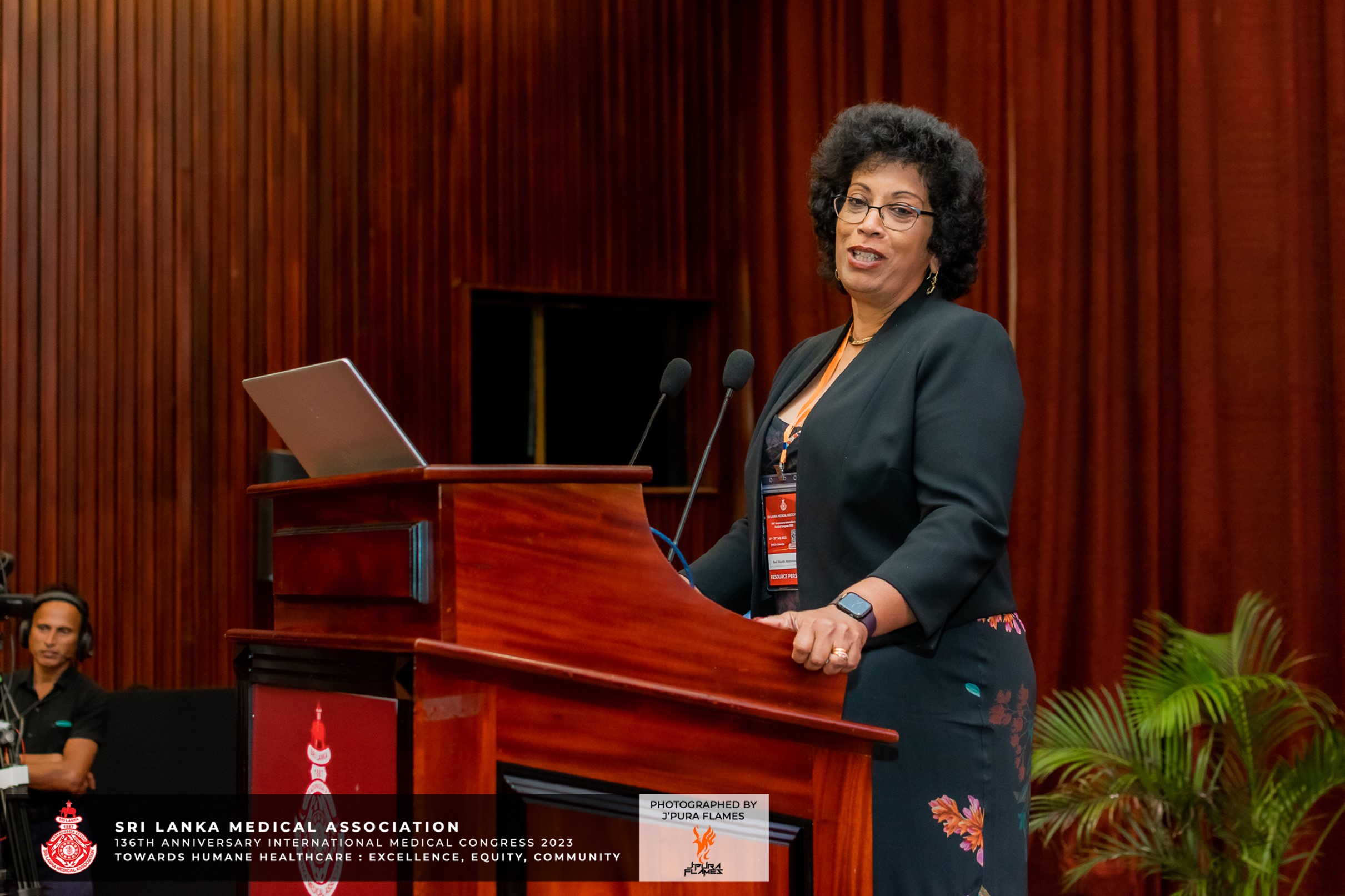
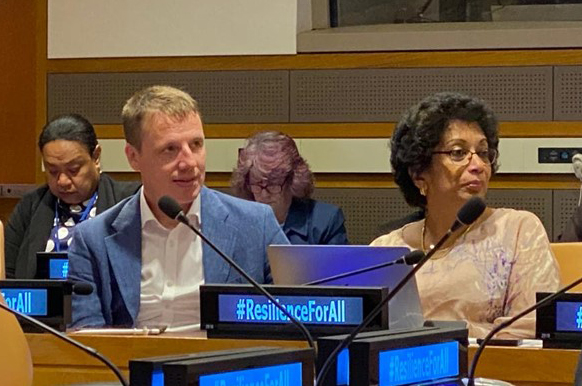
- Invited talk on Community resilience in selected past crisis. CORE Midterm review meeting, May 2023. Public Safety Communication Europe (PSCE), Brussels, Belgium
- Invited speaker on Risk analysis and uncertainty quantification. At the stakeholder workshop organised by the AGITHAR(Accelerating Global Science on Tsunami Hazard and Risk Analysis) network, 16-17th of May 2023, UCL, London. AGITHAR is a global network that aims to improve, standardise and promote tsunami research through
- Invited speech on Is Sri Lanka better prepared for the next tsunami disaster? Title of the event: Launch meeting of the 20 years after – then and now: An explorative study of the status of communities relocated in the aftermath of the 2004 Indian Ocean Tsunami in Sri Lanka. Organised by: University of Colombo, Sri Lanka. Date: March 2023
- Invited speech on Positioning DRR research and education: The need, opportunities and challenges. Title of the event: CDMR Workshop on Disaster Risk Reduction and Management Research. Organised by: Centre for Disaster Management Research (CDMR –KDU), General Sir John Kotelawala Defence University, Sri Lanka. Date: March 2023
- Facilitator, CDMR Workshop on Disaster Risk Reduction and Management Research, Visit of the Global Disaster Resilience Centre, University of Huddersfield UK Researchers to Centre for Disaster Management Research (CDMR –KDU), General Sir John Kotelawala Defence University, Sri Lanka. The Need, Opportunities and Challenges, March
- Invited talk on Institutional Landscape Optimization. SECRA Thailand Workshop, hosted by Faculty of Engineering, Naresuan University, Thailand. February 2023. ‘Strengthening University-Enterprise Collaboration for Resilient Communities in Asia’ is co-funded by the Erasmus+ Programme of the European Union. It aims at tackling the often ad hoc, episodic quality of university-enterprise collaboration (UEC) in the field of disaster resilience in the project’s partner countries, Sri Lanka, Thailand, and the Philippines.
- Event facilitator, Workshop on policy brief development. Organised by: The Project ‘SECRA’ or ‘Strengthening University-Enterprise Collaboration for Resilient Communities in Asia’, hosted by Faculty of Engineering, Naresuan University, Thailand. Co-funded by the Erasmus+ Programme of the European Union. It aims at tackling the often ad hoc, episodic quality of university-enterprise collaboration (UEC) in the field of disaster resilience in the project’s partner countries, Sri Lanka, Thailand, and the Philippines. Dates: 7th February 2023
- Facilitator, An exploratory study into nature inspired solutions (NIS) for disaster risk reduction (DRR) in coastal regions. To understand how nature’s forms, processes, and ecosystem has been used to reduce disaster risk in coastal regions using Nature Inspired Solutions. Organised by: NBRO, Colombo, Sri Lanka. Date: 13 March 2023
- Facilitator, Training workshop on tools for disaster risk reduction and urban resilience. Organised by: UN Office for Disaster Risk Reduction (UNDRR) Global Education and Training Institute (GETI); Making Cities Resilient 2030 (MCR2030); City Climate Finance Gap Fund. To strengthen local governments’ knowledge and understanding of tools to assess disaster resilience and support disaster risk reduction planning. Held in Incheon, Republic of Korea.
- Facilitator and invited speaker, CDMR workshop on disaster risk reduction and management research. Title of the event: Visit of GDRC researchers to Centre for Disaster Management Research (CDMR –KDU), General Sir John Kotelawala Defence University, Sri Lanka. Date: March 2023

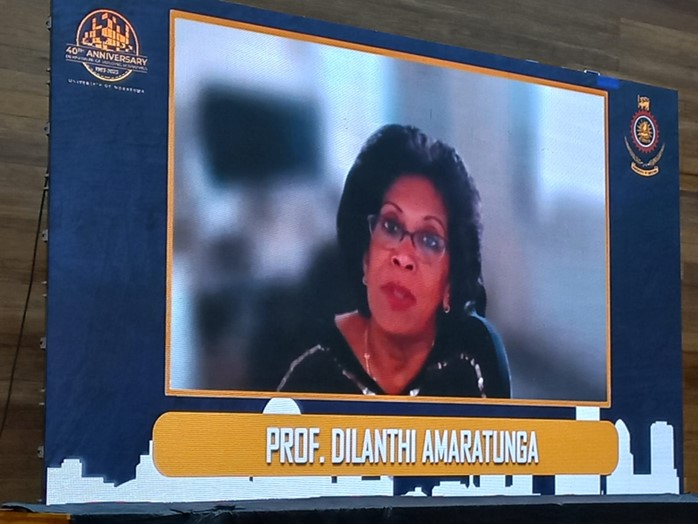
- Event facilitator, Stakeholder consultation on Indian Ocean Tsunami Exercise (IOWave23), July 2023, Disaster Management centre, Government of Sri Lanka. The IOC Intergovernmental Coordination Group for the Indian Ocean Tsunami Warning and Mitigation System (ICG/IOTWMS) at its 13th session (Bali, Indonesia, 28 November–1 December 2022, decided to organise an Indian Ocean Wave Exercise in 2023 (IOWave23) and established a Task Team to plan and conduct the exercise. At its most recent intersessional meeting, held online on 4 April, and after consultation with key stakeholders, the Task Team IOWave23 decided to conduct IOWave23 with four different scenarios on 8, 11, 18, and 25 October 2023. The four scenarios will allow individual Member States to decide the type and number of exercise scenarios to participate in. This letter provides background information and details of the IOWave23 in which all ICG/IOTWMS Member States are encouraged to participate.
- Workshop Facilitator. after you’re done with your research? Workshop in scientific writing and publishing for researchers in disaster risks and related subjects: Why publish, publication or article type, selecting a journal, writing philosophy, publishing ethics, Q & A. Organised by: National Building Research Organisation (NBRO), Sri Lanka. 24thJuly 2023
- Invited talk on What makes “working together” work? Benefits, challenges and enablers for international research partnerships. Title of the event: University of Colombo, Sri Lanka High Level Round Table. Organised by: Deans Office, Faculty of Arts, University of Colombo, Sri Lanka. Date: 13th December 2022
- Gender Equality in DRR. Title of the event: Designing an inclusive resilience – the full consideration of vulnerability before, during and after disasters. Organised by: Science and Human Factor for Resilience Society (CORE) project. Date: OCTOBER 3, 2022
- Lead Speaker, Tsunami Ready Community Launch Event Programme in Sri Lanka, State Ministry of Disaster Management, Sri Lanka. 20 April 2022. Indian Ocean Tsunami Ready Programme, led by the ICG/IOTWMS, encourages member states to commit to implement the UNESCO-IOC Tsunami Ready guideline and indicators and promote open access to high-resolution near shore bathymetry and topography data for accurate inundation and evacuation mapping in support of Tsunami Ready communities. It is a community performance-based programme, based on a set of indicators, that facilitates tsunami preparedness as an active collaboration of the public (community), community leaders, local and national emergency management agencies. My intervention covered: End to End Tsunami Warning System; Building Community preparedness; IOWAVE Exercises; Making coastal communities’ tsunami ready; Tsunami ready in the Indian Ocean and its implementation; Benefits, Roles and Responsibilities of Stakeholders; and International Recognition
- Invited speaker/Chief Guest of the Valedictory Ceremony of the International Conference on Challenges to Disaster Risk Reduction and Resilient Habitat, April 5-6, 2022. This was held in Association with the University of Delhi, National Institute of Disaster Management, Ministry of Home Affairs, Government of India & International Geographical Union Commission on Hazard and Risk. My intervention was on the Challenges to Disaster Risk Reduction and Resilient Habitat. The conference aims to highlight the challenges linked to disaster preparedness, risk reduction, resilient habitat and problems of implementation due to lack of local level capacities. This conference also intends to provide a platform for the discussions to explore how we can improve resilience against disaster and secure our habitat or mitigate risks related to disasters. It highlights on resilient human habitat and emphasizes on making our cities and habitats safer for living, resisting damage and recovering faster.
- Speaker at the “Private Sector Preparedness for Pandemics and Multi-Hazard Scenarios”, Colombo, Sri Lanka 30th of March 2022. This event which served as the launch for the Position Papers on ‘COVID: Economic Preparedness and Building Resilience’ was organised by the Ceylon Chamber of Commerce (CCC), the Social Policy Analysis and Research Centre (SPARC) of the Faculty of Arts, University of Colombo (UoC) and the Global Disaster Resilience Centre (GDRC) of the University of Huddersfield University of Huddersfield (UK). It also helped to gain fresh perspectives by reflecting on the developments since April 2021 in private sector responses to and recovery from the effects of the COVID-19 pandemic in Sri Lanka to further enhance the findings from the round table discussions.
- Guest Speaker at the ANNUAL GENERAL MEETING 2022, The Association for Disaster Risk Management Professionals (ADRiMP) Sri Lanka, 23rd March 2022. The Association for Disaster Risk Management Professionals (ADRiMP) Sri Lanka is an assembly of professionals representing varied disciplines to nurture a culture of safety in Sri Lanka from the impact of disasters and provides a platform for dialogue to achieve effective implementation of the Sendai Framework for Disaster Risk Reduction (2015-2030).my intervention was on Climate Change Adaptation and Disaster Risk Reduction Policy Coherence: For Safer Sri Lanka
- Invited speaker of the “Learn, Share, Actions”amidst the COVID-19 pandemic: “International Cooperation for Tsunami Warning and Mitigation”, organised by the Disaster Management Centre, Government of Sri Lanka, 5th November 2021, in commemorating the “World Tsunami Awareness Day 2021”. My intervention was on the effective international cooperation to reduce tsunami risks. The United Nations, through UN Resolution 70/203 adopted on 22 December 2015, has designated November 5th as the World tsunami Awareness Day (WTAD). In 2021, WTAD is an opportunity to advocate for reducing tsunami risk in Sri Lanka in the context of the “Safe Ocean” outcome of the United Nations Decade of Ocean Science for Sustainable Development (2021-2030) and the promotion of International Cooperation, the chosen target F for this year’s edition of the Sendai Seven Campaign.
- Invited talk on Effective proposal writing and acquiring foreign funded research projects. Invited facilitator of the BRITAE Professional development workshop for academics and stakeholders (Industries) in Resilience Building in Tropical Agroecosystems, held in May 2021.
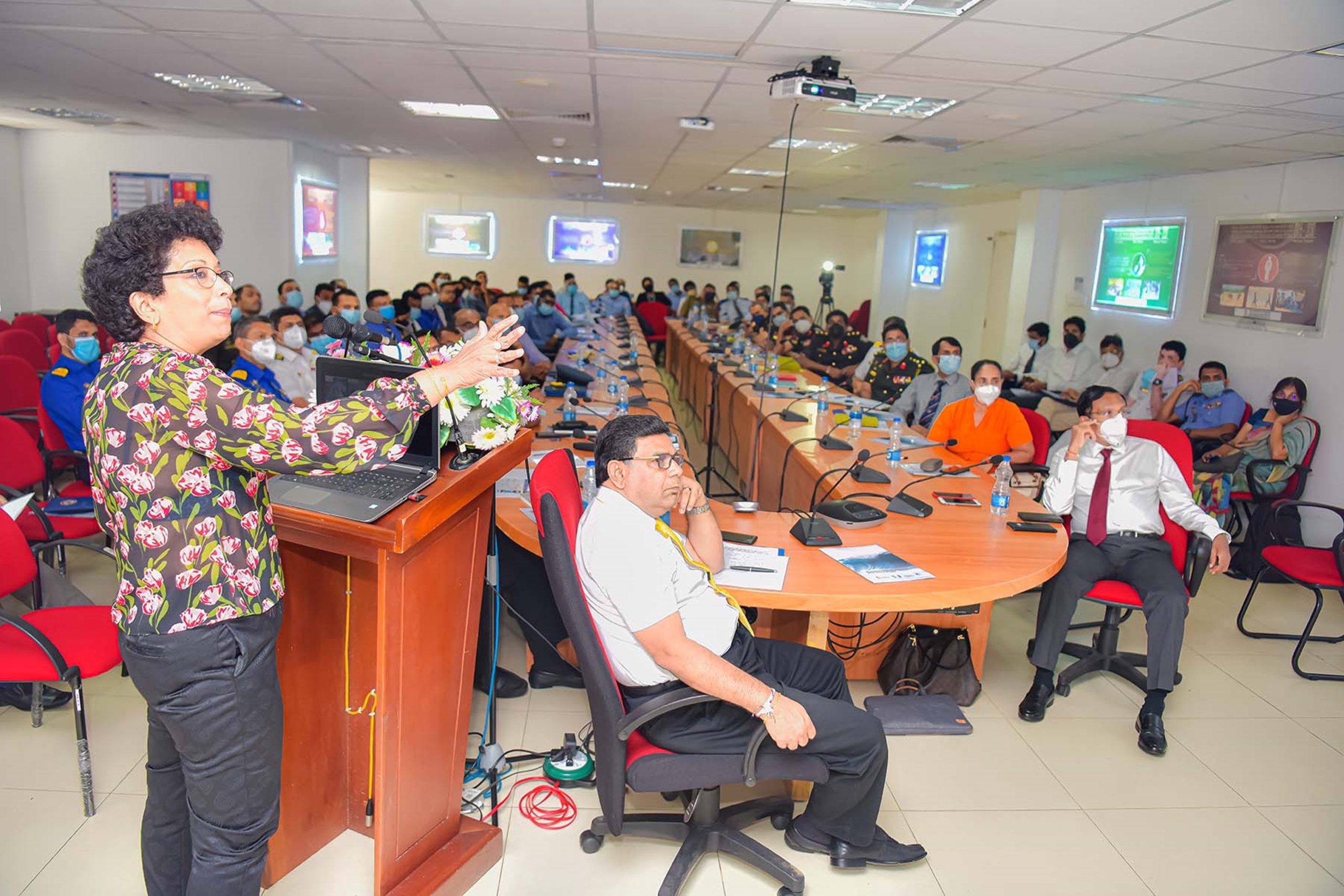
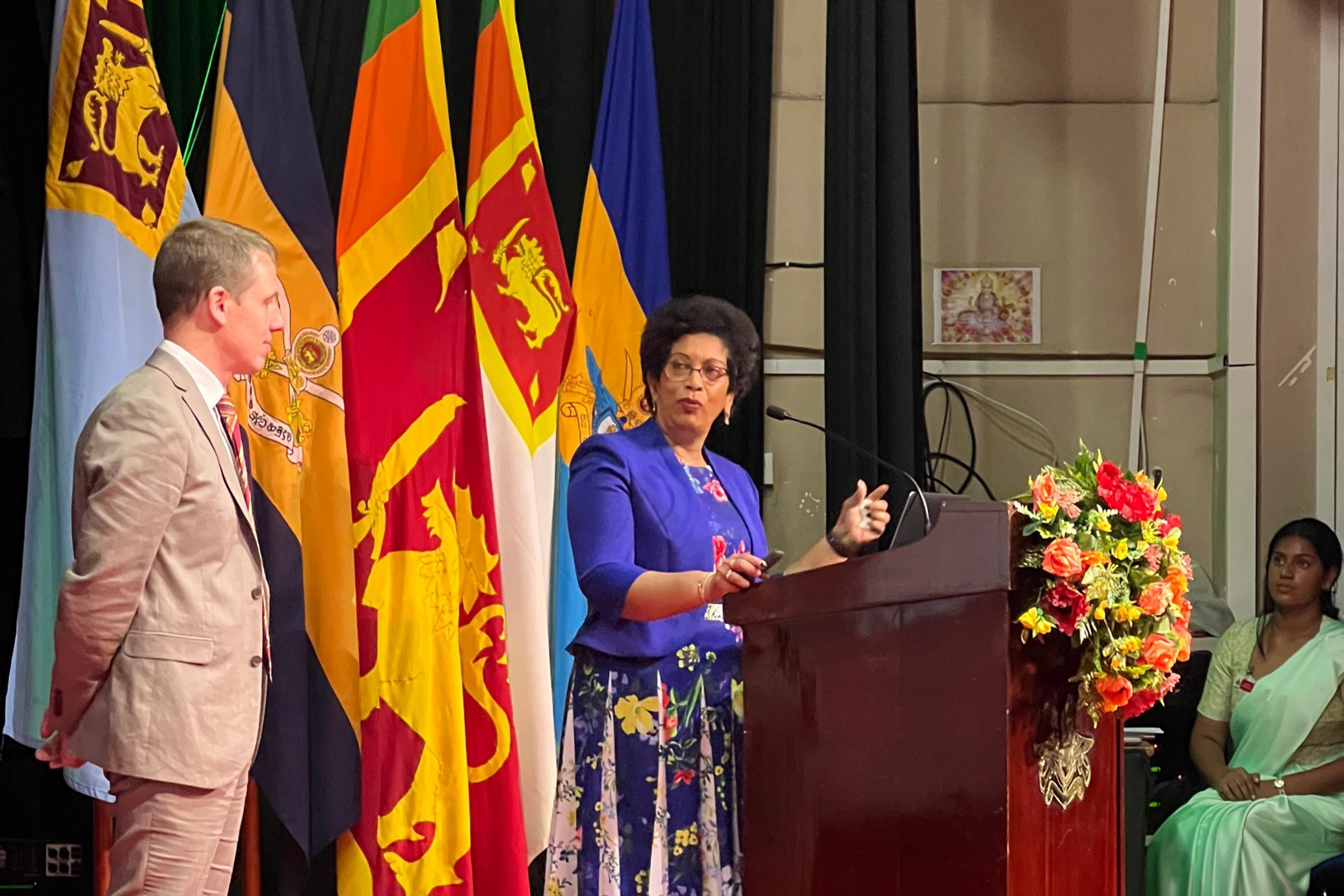
- Sustainable Future and Climate Change: Insights from Adaptation Gap Report 2020. Invited panellist at the Sustainable Future and Climate Change: Insights from Adaptation Gap Report 2020, held on the 25th January 2021. It was organised by the National Institute of Disaster Management, Ministry of Home Affairs, Government of India, jointly with: Department of Science & Technology (DST), GoI; UN – World Food Programme; United Nations Environment Programme; International Water Management Institute – CGIAR; Gorakhpur Environmental Action Group; UNICEF; ICUN-Council of Ecosystem Management; UN-ESCAP.
- Integrating Epidemic and Pandemic Preparedness into Disaster Risk Reduction. A Panellist at the International Plenary Session on Integrating Epidemic and Pandemic Preparedness into Disaster Risk Reduction, held on the 15th December 2020, Colombo, Sri Lanka.
- Special session on “Disaster Risk Reduction for sustainable built environment”. Chaired a special session on “Disaster Risk Reduction for Sustainable Built Environment”, at the 11th International Conference on Sustainable Built Environment, held from 10th – 12th December 2020, in Kandy, Sri Lanka.
- Facilitator, Introduction to academic publishing: Why publish, selecting a journal, publication or article type, and writing philosophy. Continuing Professional Development for the Institute of Engineers, Sri Lanka, the apex national body of engineers in Sri Lanka. Organiser: The Institute of Engineers, Sri Lanka, 23rd November 2022.
- Facilitator, Certificate course on Scientific Writing: Evaluation of research proposals. Continuing Professional Development for the Institute of Engineers, Sri Lanka, the apex national body of engineers in Sri Lanka. Organiser: The Institute of Engineers, Sri Lanka, 17th September 2022.
- Workshop lead, 5th International Workshop on Building Resilience in Tropical Agro-Ecosystems, Organised by: University of Huddersfield and the University of Central Lancashire, Preston, UK. Building Resilience in Tropical Agro – ecosystems (BRITAE) project covers many prioritized areas such as Education, Agriculture, Forestry and Environment and some of these key concepts were discussed and deliberated during the workshop. September 2022, University of Huddersfield, UK.
- Lead facilitator, Tsunami Ready Community Launch Event Programme in Sri Lanka, State Ministry of Disaster Management, Sri Lanka. 20 April 2022. Indian Ocean Tsunami Ready Programme, led by the ICG/IOTWMS, encourages member states to commit to implement the UNESCO-IOC Tsunami Ready guideline and indicators and promote open access to high-resolution near shore bathymetry and topography data for accurate inundation and evacuation mapping in support of Tsunami Ready communities. It is a community performance-based programme, based on a set of indicators, that facilitates tsunami preparedness as an active collaboration of the public (community), community leaders, local and national emergency management agencies. My intervention covered: End to End Tsunami Warning System; Building Community preparedness; IOWAVE Exercises; Making coastal communities’ tsunami ready; Tsunami ready in the Indian Ocean and its implementation; Benefits, Roles and Responsibilities of Stakeholders; and International Recognition.
- Facilitator of the workshop, Financial Incentives as a Strategy to Promote Disaster Resilience of the Housing Sector, National Building Research Organisation (NBRO), Sri Lanka, 19th April 2022. My intervention was on:” Disaster resilience of the housing sector and incentives as an enabler: Global perspective”. NBRO is the designated national focal point for landslide risk management in Sri Lanka. National Building Research Organisation is a leading research & development institution in the country and a reputed technical services provider in the fields of geotechnical engineering, landslide risk management, human settlements planning, environmental monitoring, building materials research, and engineering project management. NBRO functions under the purview of Ministry of Defence.
- Facilitator of the Public engagement on Incorporating citizens perspective on pandemic preparedness and response amidst a multi hazard situation in Sri Lanka, 24 – 26 March 2022. A scenario-based training on multi/compound hazard scenarios for grass root level first responders, organised by Ministry of Health Sri Lanka, incorporating two most known models to communicate and understand the risk, namely, ‘Health Belief Model’ and ‘Disaster Equation’. The event was held in Jaffna, Northern Province of Sri Lanka.
- Lead Facilitator of the Validation Workshop entitled: Improving covid-19 and pandemic preparedness through the downstream of multi-hazard early warning systems, held in Sri Lanka, 31st March 2022. Organised by University of Colombo and the Improving covid-19 and pandemic preparedness through the downstream of multi-hazard early warning systems project consortium.
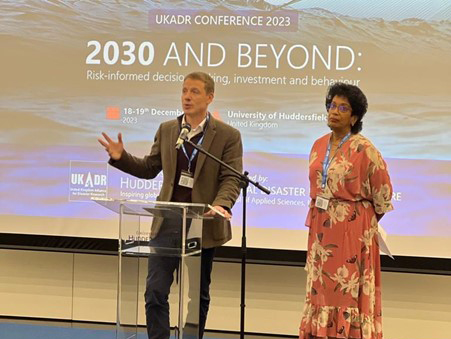
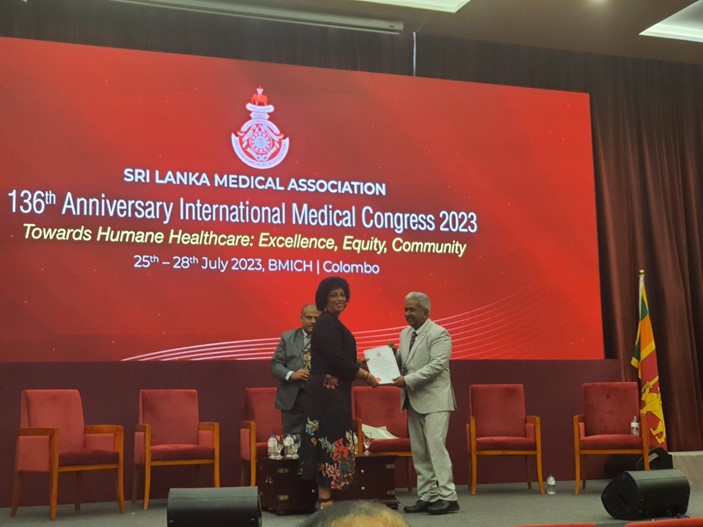
- Workshop lead, How prepared are you? Disaster Risk Reduction and Business Continuity Planning, March 2022. The main objective of this session is to create dialog on the development and implementation strategies by integrating multi-hazard business continuity management to reduce the losses caused by natural and other hazards. Aspects of this process, notably the need to understand and prioritise key sources of business risk, is a useful starting point for more strategic approaches to risk management that balance reactive and preventative approaches to risk management. This session was organised by the Group Business Development & Sustainability, Aitken Spence Corporate Finance, Sri Lanka.
- Co-Facilitator on the Workshop on Policy Brief Development. SECRA Thailand Workshop, hosted by Faculty of Engineering, Naresuan University, Thailand. February 2023. The aim of the session is to train participants in advocacy, and particularly the skill of writing policy briefs on key areas of University-Enterprise Collaboration. ‘Strengthening University-Enterprise Collaboration for Resilient Communities in Asia’ is co-funded by the Erasmus+ Programme of the European Union. It aims at tackling the often ad hoc, episodic quality of university-enterprise collaboration (UEC) in the field of disaster resilience in the project’s partner countries, Sri Lanka, Thailand, and the Philippines.
- Facilitator, Workshop Series on Urban Resilience and Response to Extreme Weather Events. Our intervention was on the Experience of and Lessons Learned in City’s Response to Extreme Events: The case of Greater Manchester Organiser: World Bank in Partnership with: Ministry of Emergency Management of People’s Republic of China. Date: Wednesday, December 7, 2022.
- Joint workshop facilitator, Dialogue on Role of Disruptive Technologies in Disaster Risk Reduction. Presenters from academia discussed the use of technologies such as AI, XR, Drones and Big data in DRR while the DRR practitioners provided insights on how the IT, AI, and big data applications are prominent as water solutions, weather solutions and in overall for DRR. Representatives from the Japanese local government and central government presented their views about the contribution and role of governance and civil society in capitalising disruptive technologies in disaster risk reduction. Organiser: Keio University Japan. There were both on-site participants and online participants, including DRR learners and educators in universities, as well as policymakers, and DRR practitioners in both private and public sectors, 1st of December, 2022, Keio University, Japan.
- Facilitator, Making Cities Resilient 2030 (MCR2030) Regional Coordination Committee – Europe Region meeting (RCC-ECA). Taking stock of progress and partner engagement; Moving forward and planning for 2023-2024; and Engagement of the Resilience Hubs and their network in the region. Our intervention was on Disaster Risk Reduction new dimensions: COVID-19 Preparedness at local level. Organiser: UNDRR, MCR 2030 Secretariat for Europe and Central Asia. Date: 23rd November 2022.
- Programme Organiser, Preconference session on Empowering communities through effective communication in dengue scenario-based training for public health midwives, Kandy, 25th February 2022. This programme focused on enhancing the skills of Public Health Midwives (PHM) on community empowerment through effective communication in Essentials of community empowerment, risk communication and health promotion in Dengue will be discussed, using scenario based interactive sessions. Supervising Public Health Midwives (SPHM) and PHM of Kandy and Kegalle districts will participate for the programme.
- Session co lead, Side event on Scaling Up DRR in Civil Protection and Healthcare Session at the 2021 European Forum for Disaster Risk Reduction, 25th November 2021, Matosinhos, Portugal. This event raised awareness about the initiatives at EU level to connect knowledge holders addressing an emerging and changing risk landscape; identified gaps COVID-19 has exposed in terms of the complexity and nonlinear nature of systemic risk; communicated evidence and lessons from the wide variations in impacts of COVID-19 to the civil protection domain; and shaped the ways forward to facilitate the increasing complexity and interdependency of risks in DRR strategies and plans at national and local level. It was organised by Disaster Competence Network AUSTRIA, and Global Disaster Resilience Centre, University of Huddersfield, UNITED KINGDOM, as part of European Forum for Disaster Risk Reduction (EFDRR), organized by the United Nations Office for Disaster Risk Reduction (UNDRR) in partnership with the European Commission and the Council of Europe.
- Speaker representing the ESTAG, at the annual global meeting of Regional STAGS (R-STAG), 30 November 2021. The meeting is the annual global forum that provides the space to share experiences, good practices, and research from across all regions. It was set up based on the calls on countries to “Enhance the scientific and technical work on disaster risk reduction and its mobilization through the coordination of existing networks and scientific research institutions at all levels and all regions with the support of the UNISDR Scientific and Technical Advisory Group”. During this annual meeting, regional experiences were shared, promoted the learning and identify practical ways to improve alignment of R-STAGs to UNDRR Global and Regional efforts to enhance Science and Policy for disaster risk reduction, R-STAGS contributions to the Risk Science Research Agenda were reviewed, and overall science landscape to plan ambitious progress for both UNDRR and R-STAGS. ESTAG is the UN’s European Science and Technology Advisory Group.
- Climate Action and Risk Informed Sustainable Development: Synergies and Trade-Offs, APEC Programme in Rejuvenating Cities and Resilience Capacities for Multi-Challenges of the COVID-19 Pandemic, Extreme Weather Events and Climate Induced Disaster (REJUVENATE-CITIES-C19). Invited speaker of the international dialogue on Climate Action and Risk Informed Sustainable Development: Synergies and Trade-Offs. Organised by Disaster Preparedness and Prevention Center, Malaysia- Japan International Institute of Technology, Universiti Teknologi Malaysia in collaboration with APEC and National Disaster Management Agency (NADMA) Malaysia in CONJUNCTION WITH INTERNATIONAL DAY FOR DISASTER RISK REDUCTION 2021. This project aims to catalyse a policy- oriented dialogues and action on multi-challenges of pandemic, extreme weather events and climate induced disasters towards increasing evidence-informed decision-making at all levels of public policy and discourse. APEC Support Fund Human Security Co-sponsoring economies include China, Japan, Chinese Taipei, Korea & Chile. October 2021.
- Contributor, Workshop in scientific writing and publishing for Indonesian researchers in disaster risk and related subjects. In June 2021, GDRC hosted a workshop in scientific writing and publishing for Indonesian researchers in disaster risk and related subjects. The event was held as part of the Newton Prize grant, funded by the UK Newton Fund and carried out in conjunction with the Institute of Technology, Bandung. The intensive two-day workshop attracted over 80 Indonesian researchers and featured a mix of short lectures, expert panel discussion, group discussions, Q&A, and 1-to-1 surgeries.
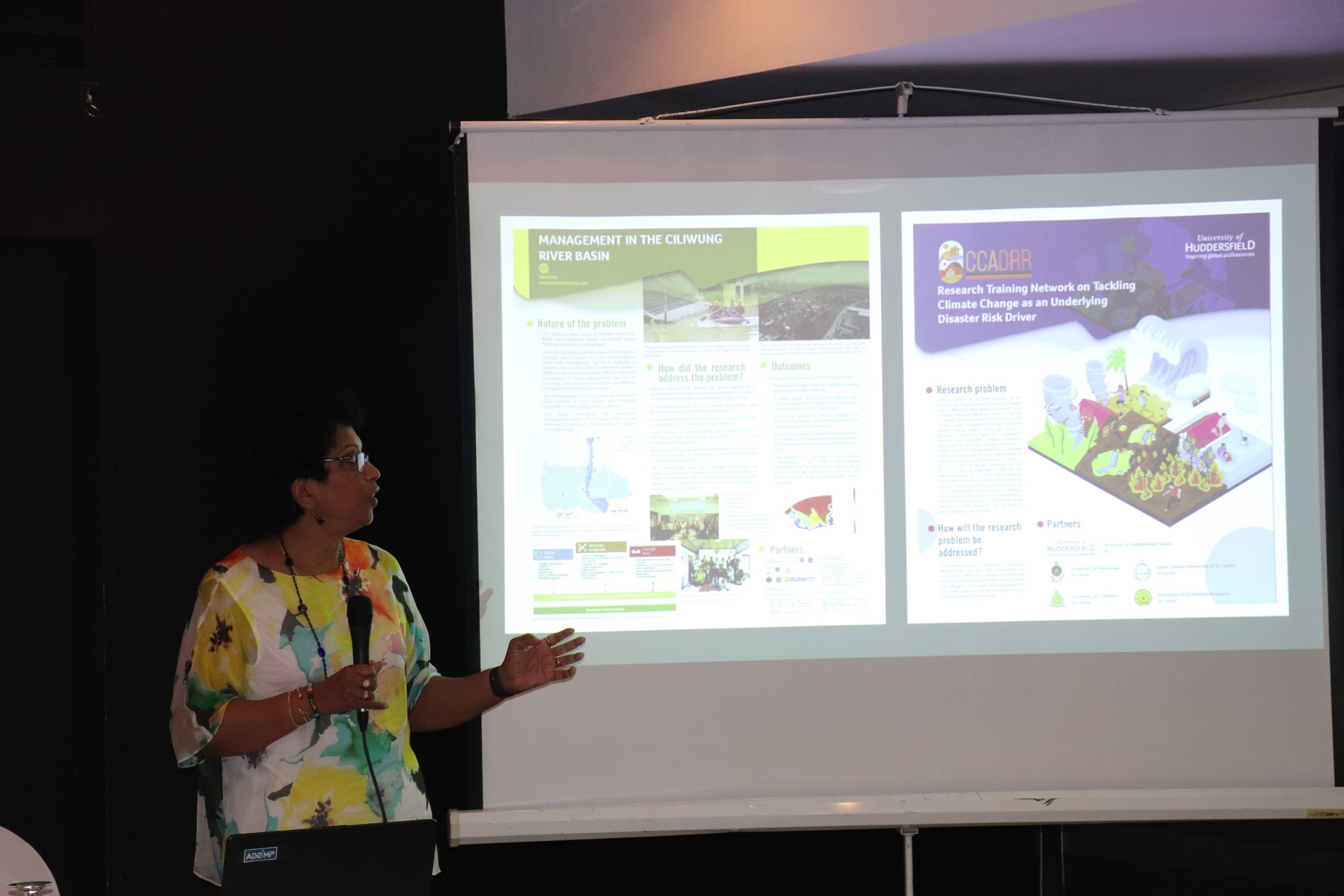
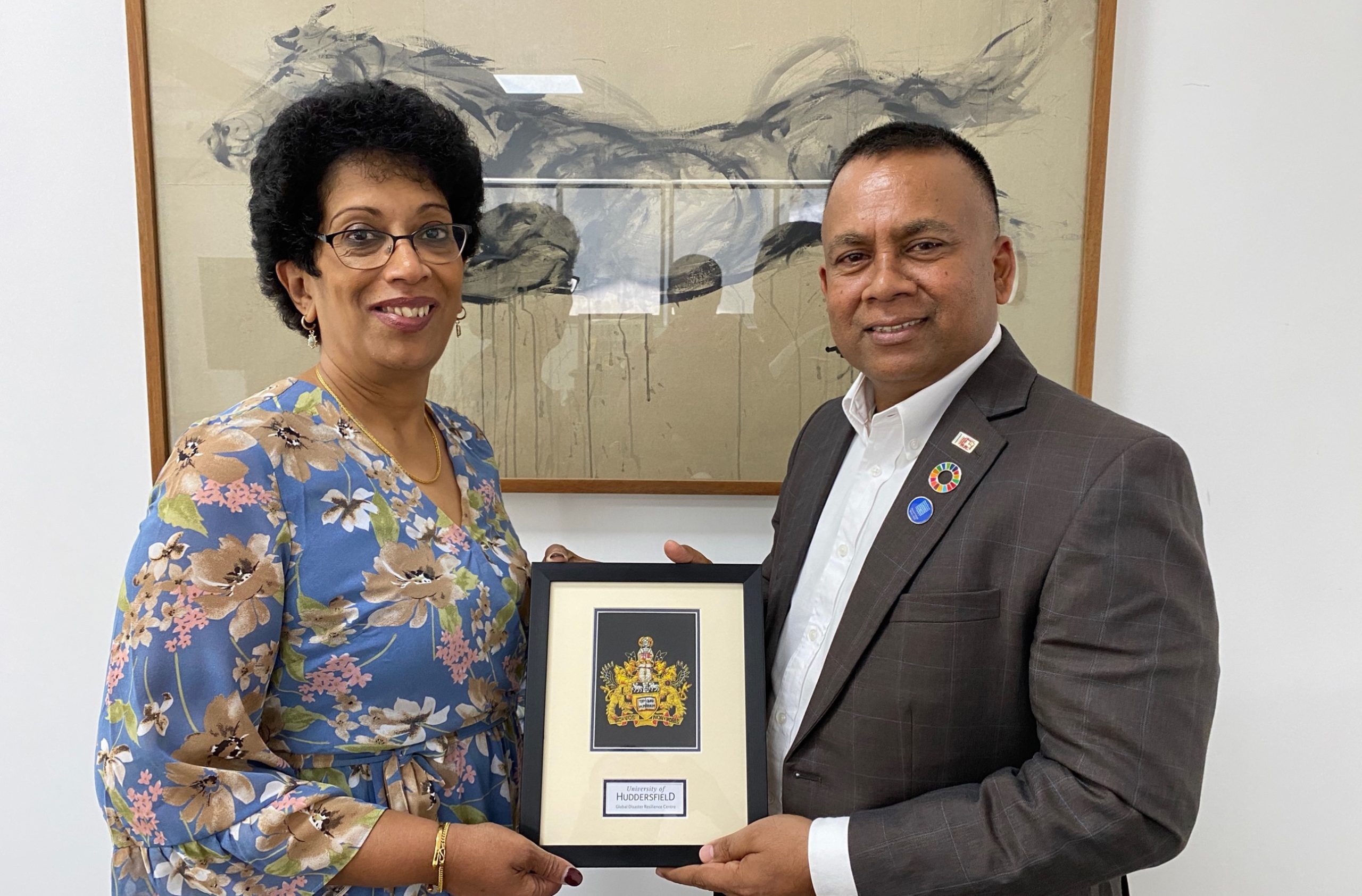
- Session lead, “Peer review process: What Editors are looking for?” Webinar on ‘Writing articles for high impact journals: a guide to researchers’, National Science Foundation (NSF) of Sri Lanka, Sri Lanka Association for the Advancement of Science (SLAAS) , and Institution of Engineers of Sri Lanka (IESL), May 2021.
- Webinar on ‘Writing articles for high impact journals: a guide to young scientists. Facilitator of the Webinar on ‘Writing articles for high impact journals: a guide to young scientists’, held on the 25th May 2021, organised by the National Science Foundation of Sri Lanka in collaboration with the Continuous Professional Development Committee (CPD) of the Institution of Engineers of Sri Lanka (IESL) and the General Research Committee (GRC) of the Sri Lanka Association for the Advancement of Science (SLAAS). This event was attended by over 1000 delegates.
- Special session on “Disaster Risk Reduction for sustainable built environment”. Chaired a special session on “Disaster Risk Reduction for sustainable built environment”, at the 11th International Conference on Sustainable Built Environment, held from 10th – 12th December 2020, in Kandy, Sri Lanka.
- Session lead on Scientific Writing, NBRO (National Building Research Organisation of Sri Lanka) April 2020.
- An invited Facilitator at the International Workshop on LOCAL DISASTER RISK REDUCTION STRATEGIES, UNDRR Global Education Training Institute (GETI), Incheon, Republic of Korea, held from 1st – 3rd October 2019. Recognising the urgency in developing local disaster risk reduction strategies, as a necessary condition to promote local action, ‘local disaster risk reduction strategies and plans are necessary to ensure the implementation of national strategies.’ The workshop resulted in a concrete UN roadmap that government can follow on accelerating the development of local disaster risk reduction strategies in the region.
- Facilitator, REGARD (REbuildinG AfteR Displacement) Stakeholder Seminar with key participants from government and UN agencies were held in Tallinn, Estonia in September 2019, on Rebuilding communities following disasters and conflict induced mass displacements from the perspective of the built environment. Discussion points included: How can we better design, develop and manage bustling, spaces and places to meet the needs of the displaced and host communities? and how can the built environment impact positively or negatively social cohesion among displaced and host communities?
- Facilitator, Department of Meteorology and Hydrology, Nay Pyi Taw, Myanmar, “Governance of the upstream-downstream interface in end-to-end tsunami early warning systems”, together with University of Yangon researchers and IOC UNESCO IOTWMS. June 2019
- Facilitator of the High-Level Forum on Sendai Framework for Disaster Risk Reduction (SFDRR) organised by Ministry of Public Administration and Disaster Management, Sri Lanka. 48 officials from government ministries and other units took part at this forum. July 2019. Ministry of Disaster Management and Public Administration, Sri Lanka.
- Facilitator of the Major Exercise held on the 11th July 2019, organised by Disaster Management Centre, Sri Lanka, in collaboration with our team from University of Huddersfield, on “Standard Operating Procedures for Tsunami Warning and Emergency Response for Sri Lanka”.It evaluated the ability of agency or system to respond to a local, regional, or ocean-wide tsunami threat and tested communications, review SOPs, promote emergency preparedness. over 45 officers representing all upstream, interface and downstream took part including the Director Generals of DMC and MET Sri Lanka.
- Facilitator – Forum on Localisation of Sendai (SFDRR) indicators in Sri Lanka, organised by Disaster Management Centre (DMC) and Association of Disaster Risk Management Professionals (ADRiMP), Sri Lanka. 17th January 2019.
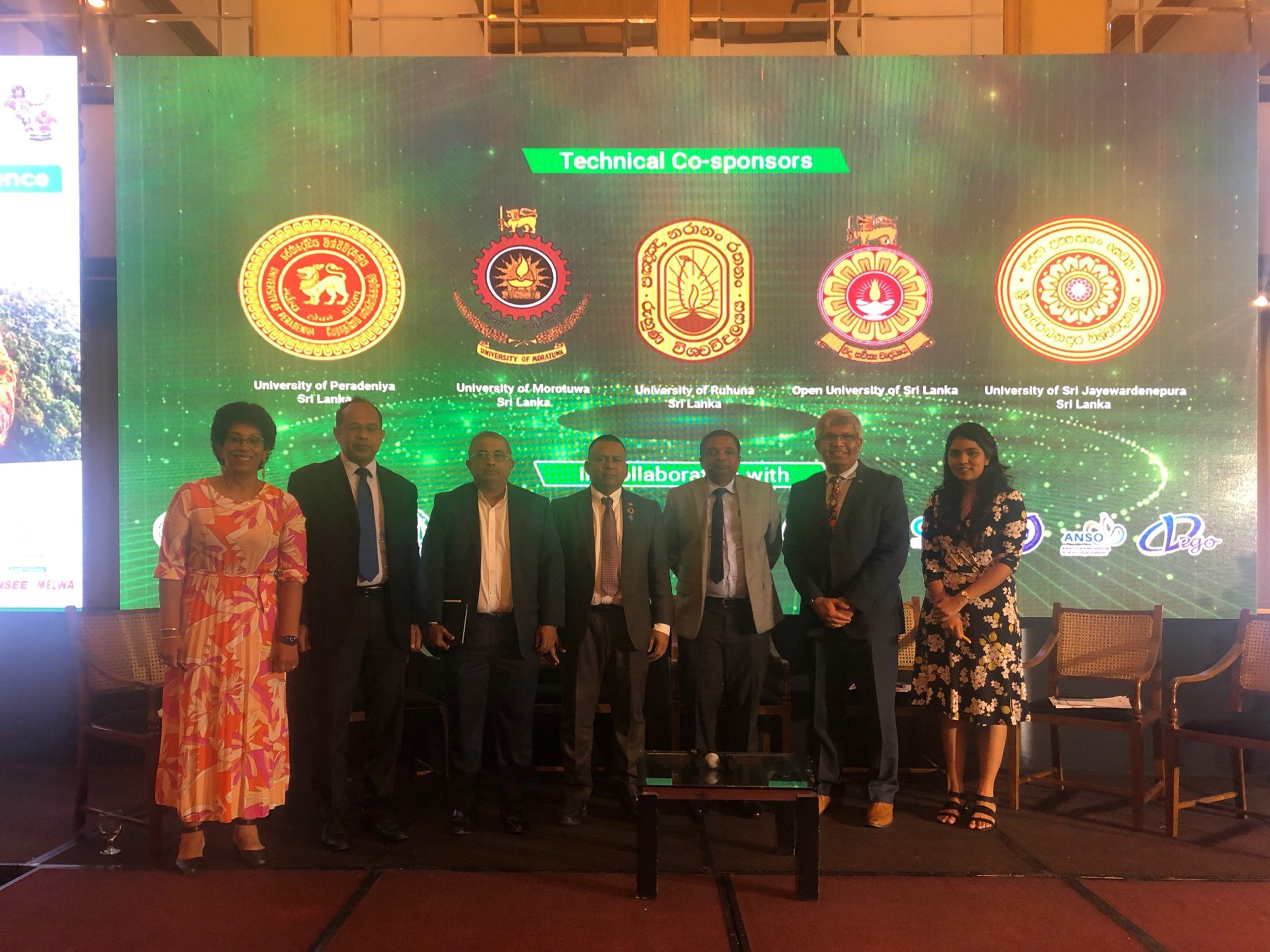

- Facilitator of the Workshop on Making Cities Resilient: Implementing the Sendai Framework for Disaster Risk Reduction at the Local Level, UNISDR Global Education and Training Institute (UNISDR GETI) , UN-HABITAT City Resilience Profiling Programme, Barcelona, Spain, 13 November 2018.
- Delivered a session entitled: “IO WAVE 2018 – Regional Tsunami Exercise: Sri Lanka experience”, at the Regional Workshop on lessons learnt from community participation and evaluation of Indian Ocean Tsunami Ready indicators in pilot communities during Exercise Indian Ocean Wave 2018 (IOWave18) held in Jakarta, 15-17 November 2018. This was based on their experiences as the appointed international observers for Sri Lanka for Exercise Indian Ocean Wave 2018 (IOWave18) held on the 5th September 2018.
- International observer for Sri Lanka for the UNESCO IOTWMS Indian Ocean Tsunami Exercise (IOWave18) held on the 5th September 2018. IOWave18 simulated all Indian Ocean countries being put in a tsunami warning situation and required the National Tsunami Warning Centre (NTWC) and the National and/or Local Disaster Management Offices (NDMO/LDMO) in each country to implement their Standard Operating Procedures (SOPs). I also shared the key points with the rest of the 28 Indian Ocean countries during the workshop: “IOTWMS-IOTIC Post-IOWave18 Lessons Learnt during Exercise Indian Ocean Wave 2018”
- Session on about the current landscape and future opportunities for advancing the dialogue between DRR and urban cities.International research workshop on: Localising Strategies for Making Cities Resilient to Disasters, 22nd January 2018 to 26th January 2018, Manila, The Philippines.
- Session on building your research profile, International research workshop on: Localising Strategies for Making Cities Resilient to Disasters, 22nd January 2018 to 26th January 2018, Manila, The Philippines.
- Session on about the current landscape and future opportunities for advancing the dialogue between DRR and urban cities. International research workshop on: Localising Strategies for Making Cities Resilient to Disasters, 22nd January 2018 to 26th January 2018, Manila, The Philippines.
- Session on building your research profile. International research workshop on: Localising Strategies for Making Cities Resilient to Disasters, 22nd January 2018 to 26th January 2018, Manila, The Philippines.
- Session lead, Climate Change Adaptation and Disaster Risk Reduction Challenge Workshop, Wissenschaftszentrum, Bonn, Germany, 4th May 2017.
- International Seminar Leader, Mainstreaming Disaster Resilience within the Construction Process. Visit of the High-Level Government and Local Government Delegation from Sri Lanka, 27th January 2017.
- Led a workshop for Sri Lankan academics on International collaborations (“Benefits, challenges and enablers for international research partnerships”) at the Sri Lanka National Science Foundation (NSF). I was invited to be one of the lead facilitators by by Dr Thamara F. Dias, Director General of NSF for this work. The National Science Foundation (NSF) is Sri Lanka’s Key Research Funding Council which is committed to generate knowledge, dissemination and transfer of knowledge and, more importantly, to ensure the effective utilization of knowledge, for the greater benefit. December 2016.
- Led a workshop on International Research, upon an invitation received from the Vice Chancellor of University of Moratuwa, Sri Lanka, Prof. Ananada Jayawardena on the 16th December 2016.
- An invited facilitator at the Agenda Setting Workshop entitled “Creating a Resilient Future for Greater Manchester”, held at Manchester Town Hall on the 29thNovember 2016. It was organised by the Greater Manchester Combined Authority (GMCA) and 100 Resilient Cities, a $164 million programme pioneered by The Rockefeller Foundation, where city leaders and practitioners from across Greater Manchester came together to collectively set the agenda for Greater Manchester’s resilience journey. 100 Resilient Cities – Pioneered by The Rockefeller Foundation (100RC) is an initiative dedicated to helping cities to be better prepared for and quickly rebound from 21st century shocks and stresses.
- Session with the RICS (The Royal Institution of Chartered Surveyors) on the topic of “Mainstreaming disaster resilience within the construction process”. Met with Alan Muse (RICS Global Director of Built Environment) and David Tuffin (Former RICS President and the RICS DM Champion). November 2016.
- Mainstreaming Disaster Resilience within the Construction Processes, lead facilitator of the CADRE WORKSHOP on Mainstreaming Disaster Resilience within the Construction Process was held at the 6th International Building Resilience Conference 2016 in Auckland, New Zealand, from 7-9th of September 2016.
- Lead facilitator of the Roundtable discussion: on the Direction of the Development of Sendai Framework “Words into Action” Implementation Guide for Construction Policy and Practice, a UNISDR initiative, was held at the recently held 6th International Building Resilience Conference 2016 in Auckland, New Zealand, from 7-9th of September 2016.
- A training event with local government and key stakeholders on “Global agendas for building more sustainable, disaster resilient communities” was facilitated in July 2016 in Eastern Provincial Council of Sri Lanka. Its Minister of Transport Hon. Ariyawathie Galappathi and its Chief Secretary Mr.D.M. Sarath Abayagunawardana led the proceedings with the participation of 20 other government officials from the region.
- Session lead, Development of Sendai Framework “Words into Action” Implementation Guides Working Group on DRR Governance and Accountability, Sendai Framework “Words into Action” Implementation Guides Working Group on DRR Governance and Accountability (25th January 2016), UNISDR, Geneva, Switzerland.
- Lead facilitator of an international workshop entitled: “ Market Demands in the Construction Industry to Increase Societal Resilience to Disasters”, 9th December 2015 in Colombo, Sri Lanka as part of the CADRE (Collaborative Action towards Disaster Resilience Education)
- Facilitator at an international workshop entitled “Ensuring Accountability in Disaster Risk Management and Reconstruction” organized as a part of a global, regional and national partnership by SPARC, University of Colombo-Sri Lanka and Global Disaster Resilience Centre (GDRC), University of Huddersfield-UK, and Essex Accounting Centre, University of Essex-UK on the 8th December 2015 in Colombo Sri Lanka.
- Session lead on “Research funding opportunities” at the British Council and Newton Researcher Links programme, funded multi-disciplinary international workshop entitled Development of Disaster Resilient Coastal Communities to Enhance Economic Development and Social Welfare, Bandung Institute of Technology, Indonesia, from 28th October – 1st November 2015
- Session lead on “Publishing your research” at the British Council and Newton Researcher Links programme, funded multi-disciplinary international workshop entitled Development of Disaster Resilient Coastal Communities to Enhance Economic Development and Social Welfare, Bandung Institute of Technology, Indonesia, from 28th October – 1st November 2015
- Session lead on “Raising Your Profile or How to let others know you are doing OK !!” at the British Council and Newton Researcher Links programme, funded multi-disciplinary international workshop entitled Development of Disaster Resilient Coastal Communities to Enhance Economic Development and Social Welfare, Bandung Institute of Technology, Indonesia, from 28th October – 1st November 2015
- Contributor at the “Leading Disaster Risk Reduction: A seminar on preparing for and responding to disasters”, held on the 1st October 2015 in the Mountbatten Room, Christ’s College, University of Cambridge.
- Organiser and facilitator Reducing Disaster Risk in Urban Settings – Intergovernmental Segment, Ministerial Roundtable, 16th March 2015, at Sendai International Centre, Japan as part of the UN World Conference on Disaster Risk Reduction.
- Organiser and facilitator – Local Governments Roundtable, The Sendai International Centre in Japan, Third United Nations World Conference on Disaster Reduction (WCDRR), March 2015.
- Session facilitator, Ecosystem Resilience in a Changing Climate. This programme was held from 18th to 21st May 2015 at the SIHYMECC Auditorium, Ho Chi Minh, Vietnam and was organized by the Asian Disaster Preparedness Centre, Thailand. This programme was held from 18th to 21st May 2015 at the SIHYMECC Auditorium, Ho Chi Minh, Vietnam.
- Lead facilitator, open briefing event on CASCADE findings. The major findings from the CASCADE project were presented at an open briefing event at the UK Research Office in Brussels. The event, held on 9th March 2015 was attended by over 25 representatives from European and South Asian government agencies, as well as funding bodies and other research groups. The event was held to raise awareness about the project and the opportunities for research and innovation collaboration between the EU and South Asia
- Lead facilitator, Horizon 2020: Collaborating with EU Researchers for Research Excellence, 2nd December 2014, UGC Auditorium, 20, Ward Place, Colombo 07, Sri Lanka. The University Grants Commission (UGC) is the apex body of the University System in Sri Lanka which. The functions of the UGC are: planning and coordination of university education, allocation of funds to Higher Educational Institutions (HEIs), maintenance of academic standards, regulation of the administration of HEIs and regulation of admission of students to HEIs. Its vision is to be an excellent regulatory body which guide, develop and sustain a network of ‘Centers of Excellence’ in higher education meeting the national needs and aspirations in keeping with global trends. All 15 Sri Lankan universities are under its umbrella: University of Colombo, University of Peradeniya, University of Sri Jayewardenepura, University of Kelaniya, University of Moratuwa, University of Jaffna, University of Ruhuna, The Open University of Sri Lanka, South Eastern University of Sri Lanka, Rajarata University of Sri Lanka, Sabaragamuwa University of Sri Lanka, Wayamba University of Sri Lanka, Uva Wellassa University, University of the Visual & Performing Arts, Vice Chancellors of all these universities along with other scientists attended the event.
- Preparatory Committee (Prep Com) second session discussions, leading up to the third UN World Conference on Disaster Risk Reduction, to be held in Geneva Switzerland in November 2014.
- Session lead, Collaborative Action towards Societal Challenges through Awareness, Development and Education (CASCADE) Regional project – Sri Lanka’s contribution), Science, Systems and Application towards sustainable Disaster Management, the future we want; Safer Sri Lanka; Disaster Management Conference; 24-26 September, 2014 – BMICH, Colombo 07, Sri Lanka. Organised by Asian Disaster Preparedness Center (ADPC) in collaboration with Ministry of Disaster Management, Disaster management Centre, Department of Meteorology, National Building Research Organization, Universities of Salford, UK, Peradeniya & Ruhuna, Sri Lanka.
- Lead facilitator, The Horizon 2020: Teaming up with the EU for Research Excellence, A workshop for Sri Lankan Scientists, organized by the National Science Foundation, Sri Lanka, in Collaboration with the European Union. May 2014.
- Lead, The Horizon 2020: Teaming up with the EU for Research Excellence – A workshop for Sri Lankan Scientists; organized by the National Science Foundation, Sri Lanka in Collaboration with the European Union, 2 May 2014, At the Auditorium, National Science Foundation, Sri Lanka, in collaboration with CASCADE (Collaborative Action towards Societal Challenges through Awareness, Development, and Education).
- Lead, “Pathways for Sri Lankan Scientists via Horizon 2020: Opportunities for South Asian Institutions – a Workshop for University of Moratuwa Academic staff”, 2nd May 2014, Engineering faculty board room, University of Moratuwa, Sri Lanka, in collaboration with CASCADE (Collaborative Action towards Societal Challenges through Awareness, Development, and Education).
- Session lead, The Horizon 2020 – funding opportunities for research excellence; CIB INTERNATIONAL CONFERENCE 2014: W55/65/89/92/96/102/117 & TG72/74/81/83 Construction in a Changing World; KANDLAMA, SRI LANKA, MAY 2014; in collaboration with CASCADE (Collaborative Action towards Societal Challenges through Awareness, Development, and Education).
- UNHABITAT World Urban Forum – Resilience Dialogue: Raising Standards of Urban Resilience Friday, 11 April 2014, Medellín, Columbia, (The primary aim of this Dialogue is to demonstrate how a holistic approach to urban resilience that considers all functions of an urban system can contribute to making all cities more equitable places to live and work).
- UNHABITAT World Urban Forum University round table: Universities addressing Urban challenges. 10 April 2014, Medellín, Columbia. The roundtable gathered scholars, experts, researchers, university representatives and heads of thematic areas of UN- Habitat to discuss the role of knowledge and education, as well as the possible contributions of universities to address the challenges of sustainable urbanisation in the 21st
- UNHABITAT World Urban Forum Gender and women round table – Gender equality and the new urban agenda. 11 April 2014, Medellín, Columbia. It addressed the linkages between gender equality, women’s empowerment and urbanisation as positive drivers of the New Urban Agenda, emphasizing the centrality of gender equality and women’s empowerment in furthering economic growth and achieving sustainable development in the New Urban Agenda. It also identified, developed and promoted strategies for enhancing gender equality and women’s empowerment as an integral part of the transformative change in the New Urban Agenda towards Post-2015, the Sustainable Development Goals and Habitat III.
- Workshop Leader on “Capacity Building on Disaster Resilient Measures”, Southern Province, Sri Lanka – 17th September 2013, Herritance Ahungalle, Sri Lanka. In association with International Conference on Building Resilience 2013, Heritance Ahungalla, Sri Lanka 17th – 19th September 2013. Collaborators: Federation of Sri Lankan Local Government Authorities; Southern Provisional Council, Sri Lanka; and Centre for Disaster Resilience, University of Salford; In support of UNISDR Resilient Cities Programme.
- National launch of the United Nations Global Assessment Report. In association with International Conference on Building Resilience 2013, Heritance Ahungalla, Sri Lanka 17th – 19th September 2013. The United Nations Office for Disaster Risk Reduction, in its third and the latest edition, emphasises the importance of the business case for disaster risk reduction. It highlights how the transformation of the global economy over the last forty years has led to rapid increases in disaster risk in low, medium and high-income countries, affecting businesses and societies. The GAR report states that economic losses linked to natural disasters are ‘out of control’ and will only increase without more focus on disaster risk management. This can only be reduced with an effective public and private sector partnership. A panel discussion at the Conference provided an opportunity to contextualise the GAR theme within a Sri Lankan context.
- Workshop Leader on “Millennium Development Goals”, Planning Urban and Rural Infrastructure, Development Practice Programme of the University of Peradeniya, Sri Lanka. This is supported by MacArthur Foundation and the Earth Institute, Columbia University and is part of a global network of over 20 similar programmes in 16 countries which have been developed in accordance with the recommendations of the International Commission on Education for Sustainable Development Practice. July 2013.
- Workshop Leader on “Poverty and infrastructure”, Planning Urban and Rural Infrastructure, Development Practice Programme of the University of Peradeniya, Sri Lanka. July 2013.
- Workshop Leader on “Writing a good proposal”, Department of Civil Engineering, RAZAK School of Engineering and Advanced Technology, Universiti Teknologi Malaysia, March 2013.
- Workshop Leader on “An insider’s guide to getting published in research journal”, RAZAK School of Engineering and Advanced Technology, Universiti Teknologi Malaysia, March 2013.
- Workshop Lead on Communication Research Needs for Building Societal Resilience, RMIT University, Melbourne, Australia, November 2012.
- Session on Challenges in Managing Housing Needs in Post-Conflict Housing Reconstruction, Towards a Research Partnership in Disaster Management and Resilience Symposium, 29th November 2012, RMIT University, Melbourne, Australia.
- Session on Rebuilding for Resilience: Post-Disaster Reconstruction of the Built Environment, Breaking the Mould Conference, Durham University Humanitarian Aid and Empowering Local Communities, 1st – 3rd August 2012, Durham University, Calman Learning Centre, Durham.
- Session on Evaluation of Community Risk Assessment method for development of disaster risk reduction strategies and climate change adaptation plans, Breaking the Mould international conference, Breaking the Mould Conference, Durham University Humanitarian Aid and Empowering Local Communities, 1st – 3rd August, 2012, Durham University, Calman Learning Centre, Durham.
- Invited session on Creating Disaster Resilient Cities, Breaking the Mould international conference, Durham University Humanitarian Aid and Empowering Local Communities, 1st – 3rd August 2012, Durham University, Calman Learning Centre, Durham.
- Session lead on “Gender sensitivity in reconstruction”. Seminar on Reconstruction as a tool for conflict transformation and peace building, March 2012, Colombo, Sri Lanka.
- Session on “Ten-point Checklist – Essentials for Making Cities Resilient”, Resilient City Programme, Sri Lanka – Disaster Risk Management Training Program for Local Government Councils, organised by the Ministry of Disaster Management Sri Lanka and Disaster Management Centre, Sri Lanka in Batticaloa, Sri Lanka, March 2012. Participants included representatives from Mannar UC, Eravur UC and Batticaloa MC, District DMC Assistant Directors, Resource Persons and Facilitators.
- Workshop and CPD Event Lead – “Lifelong Learning: Challenges and Responses to Quantity Surveying Educational Needs – BELLCURVE (Built Environment Lifelong Learning Challenging University Responses to Vocational Education)”. “Cost management in a real world emerging from adversity”, 15th Pacific Association of Quantity Surveyors Congress, Organised by Institute of Quantity Surveyors Sri Lanka (IQSSL), July 2011, Sri Lanka.
- Session lead, International Conference on Sustainable Built Environment, Kandy, Sri Lanka, December 2010.
- Session lead “Emergency Preparedness” – Annual International Conference on Disaster Management, organized by the International Institute for Infrastructure, Renewal and Reconstruction (IIIRR), USA, in collaboration with American Society of Civil Engineers (ASCE), USA, November 2010.
- Session lead. International Workshop on Disaster Risk reduction and Resilient Cities, Batticaloa, Eastern Sri Lanka, June 2010. Resilient Cities Initiative 2010 – 2011. United Nations International Strategy for Disaster Reduction (UNISDR).
- National Training Workshop on Disaster Risk Assessment and Management for the Coastal Zone of Sri Lanka – Developing a knowledge base on Hazards, Vulnerabilities and Capacities for Disaster Risk Reduction, Colombo, Sri Lanka, June 2010.
- Session chair, Workshop on Capacity Development for Disaster Risk Reduction in the Built Environment, CIB World Congress 2010: Meeting Society’s Challenges – Disaster Management, CIB World Congress, Salford Quays, Salford, UK, May 2010.
- Session lead: “Capacity building for disaster preparedness and reconstruction, at the UNDP National Training Workshop on Disaster Risk Assessment and Management for the Coastal Zone of Sri Lanka – Developing a knowledge base on Hazards, Vulnerabilities and Capacities for Disaster Risk Reduction, Colombo, Sri Lanka.
- Session on Disaster “risk reduction and the built environment”, Department of Civil Engineering, University of Melbourne, Melbourne, Australia, March 2010.
- Session on “social impact of reconstruction”, Centre for Refugee Studies, York University, Toronto, Canada.
- Session lead at the Mini-Symposium organised by the International Institute for Infrastructure, Renewal and Reconstruction (IIIRR), Schulich School of Engineering, University of Calgary, Canada, February 2010. Title of the symposium was “Best practices for disaster management” and the title of the session was “Risk management for community-based post disaster reconstruction”.
- Session on disasters and the built environment, Eastern University of Sri Lanka, Batticaloa, Sri Lanka, November 2009.
- Session lead – disaster management applications in the built environment. University of Cape Town, South Africa, October 2009.
- Session lead titled “Capacity building for rehabilitation and reconstruction”. annual international conference on “Impact of natural hazards and disasters on social & economic infrastructure development, organised by the Infrastructure Institute for Renewal & Reconstruction, Ahungalla, Sri Lanka, July 2009.
- Session lead, session title “Disaster Risk Reduction through capacity building – Sharing and Managing the Lessons Learnt from Asian Tsunami”, Ministry of Disaster Management and Human Rights, Disaster Management Centre International Symposium on “Impact of Post Disaster Waste Management towards Disaster Risk Reduction, National Symposium on Promoting Knowledge transfer to Strengthen Disaster Risk Reduction & Climate Change Adoption”, Colombo, Sri Lanka, 2008.
- Leader – EURASIA (European and Asian Infrastructure Advantage) Workshop, The International Symposium on Automation and Robotics in Construction (ISARC 2008) – 25th jubilee symposium. The 25th ISARC (ISARC 2008) was held in Vilnius, Lithuania, from June 27th to 29th of 2008. Title of the session “Development of a Virtual Research Environment to Enhance Collaboration on International Research Projects”.
- Invited to lead a weeklong workshop on creation and long-term management of public and commercial facilities and infrastructure at the Department of Building Economics, University of Moratuwa, Sri Lanka. June 2007.
- Invited to deliver a series of seminars, workshops and lecturers on long-term management of facilities and infrastructure management at the University of Moratuwa, Sri Lanka. June 2007.
- Invited to lead a workshop on PhD research skills and delivered an invited presentation titled “presentation on writing for academic publications” and “surviving the viva”, University of Malaya, Kuala Lumpur, Malaysia, September 2007.
- Invited to lead a workshop on PhD research skills and delivered an invited presentation titled “presentation on writing for academic publications” and “surviving the viva”, Universiti Teknologi Mara (UiTM), Shah Alam, Malaysia, September 2007.
- Invited to lead a research skills development workshop, CIB World Congress, Cape Town, South Africa, May 2007. This event was organised and hosted by the Southern African Built Environment Research Center (SABERC), Cape Peninsula University of Technology, Cape Town, South Africa and University of Port Elizabeth – Department of Construction Management – Institute for the Study of Construction Processes, South Africa.
- Invited to lead a session and deliver a presentation titled “Disaster management and construction” Annual Bank Conference on Development Economics, “The role of the construction industry in disaster preparedness, response and recovery”, The World Bank, Bled, Slovenia, May 2007.
- Invited international workshops and seminars, emphasising the international standing in the field: for e.g. Leader for Session on Disaster Management, RICS COBRA Conference: London, September 2006.
- Invited by the CIB (International Council for Research and Innovation in Building and Construction) to develop a set of guidelines on supplementary skills for postgraduate students. 2006.
- Invited session as part of the 6th International Postgraduate Research Conference in the Built and Human Environment conference. Held at TNO Delft, The Netherlands, 2006. Workshop entitled “Qualitative data analysis”.
- Several invited presentations at national/international teaching and learning conferences, lectures and seminars, most recent being the presentations made at 2nd annual built environment education conference (BEECON 2006) on Recruitment and Retention: The way forward, held in London from 12- 13 September 2006 and Bringing Research and Teaching Together, The Higher Education Academy Conference, November 2006.
- Invited to lead an international research workshops part of the CIB W89 International Conference on Building Education and Research (BEAR2006) held in Hong Kong. Title of the workshop was “Research Methodologies”. 2006.
- Invited to lead a special Session on “Post Disaster Management Strategies”. 2006 Royal Institution of Chartered Surveyors (RICS) annual International Conference (COBRA), University College London. Session included an introduction to the work of the RICS Disaster Management Commission and presentations based on three papers titled: “An exploration of the construction industry’s role in disaster preparedness, response and recovery”; “Review of impact of post tsunami reconstruction and rehabilitation on infrastructure facilities”; and “Role of Built Environment education curricula in post disaster recovery management”.
- Invited session as part of the 5th International Postgraduate Research Conference in the Built and Human Environment conference. Held at Salford Quays, Salford: UK, 2005. Workshop entitled “Structuring the thesis and its preparation”.
- Facilitator for CIB international research methodology Workshop, CIB W89 BEAR 2006 Conference, Hong Kong: April 2006, Research methods CIOB workshop, QUT, Brisbane, Austrian, July 2005.
- Invited to lead two workshops organised as part of the Queensland University of Technology (QUT) Research Week and RICS COBRA annual International Conference held in Australia. Titles of the workshops held were: “Research Methods” and “Thesis Writing”. 2005.
- Invited presentation at Workshop on Teaching and Research Relationship: Developing Institutional Policy and Practice on a UK-wide conference on institutional policies, structures, processes and practices to develop the relationship between teaching and research. Higher Education Academy, London. November 2005.
- Invited session as part of the 4th International Postgraduate Research Conference in the Built and Human Environment conference. Held at Salford Quays, Salford: UK, 2004. Workshop entitled “Completing your PhD successfully”.
- Invited to lead a research methodology workshop. University of Moratuwa, December 2004. Titles of the sessions were: “Overview of Qualitative and Quantitative Paradigms”; “Use of case studies in building and construction research”; and “Use of surveys and interviews to gather data”, 2004.
- Invited by the University of Moratuwa, Sri Lanka to deliver a programme on research methodology (qualitative and quantitative research methods (for built environment research University of Moratuwa, Sri Lanka (Sri Lanka, 2004).
- Invited to lead various staff development workshops for the benefit of fellow members of academic staff and research staff: for e.g. “Good Practice Guidelines for Research Knowledge Transfer into teaching within the Built Environment”, “Improving Dissertation Assessment Practice”. These workshops help to promote ideas and initiative in this area, which has become of critical importance as we seek to exploit our excellent research activities for the benefit of the profession. 2001 – 2004.
- Facilitated a workshop on, “Stakeholder engagement to address social vulnerability”, Regional Workshop on Coastal Hazards and applications in Risk Assessment and Mitigation organised by UNESCO/IOC, Paris, 19-22 March 2013, Mount Lavinia Hotel, Sri Lanka.
- Session lead on Gender Mainstreaming in Construction, Chamber of Construction Industry Sri Lanka, Habarana, Sri Lanka, December 2011.
- Session Lead on Gender Mainstreaming in Conflict Transformation: The Built Environment’s Perspective, Chamber of Construction Industry Sri Lanka, Habarana, Sri Lanka, December 2011.
- Session Lead titled: “Disaster Resilient Built Environment: A Community Based Disaster Risk Reduction Approach”, Patuakhali Science and Technology University, Patuakhali, Bangladesh, September 2011.
- Leader, Disaster Management theme, RICS Construction, Building and Real Estate International Research conference (COBRA 2010), September 2010, Paris, France.
- “Building Capacity for Disaster Resilience” Theme Leader, “Total Disaster Management: From Effective Prevention to Post Disaster Full Recovery – “Emergent research themes and directions for the future” Royal Institution of Chartered Surveyors (RICS) seminar, Salford, UK. 2008.
- Session lead on “Capacities, Disasters and the Built Environment: Strategies to enhance capacity for disaster mitigation and reconstruction of the built environment”, Social Development and Transition: Paths for Global-Local Partnership conference, Kathmandu, Nepal, organised by The Asia-Pacific Branch of the International Consortium for Social Development, in Kathmandu, Nepal. November 2008.
- Session leader, Building Capacity for Disaster resilience, Royal Institution of Chartered Surveyors (RICS) Total Disaster Management: From Effective Prevention to Post Disaster Full Recovery – “Emergent research themes and directions for the future”, University of Salford, UK, January 2008.
- Invited by the Department of Building Economics, University of Moratuwa, Sri Lanka to deliver a series of lectures on research methodologies for its undergraduate and postgraduate students. December 2004.
- Many international conference presentations were made from 1994 onwards.